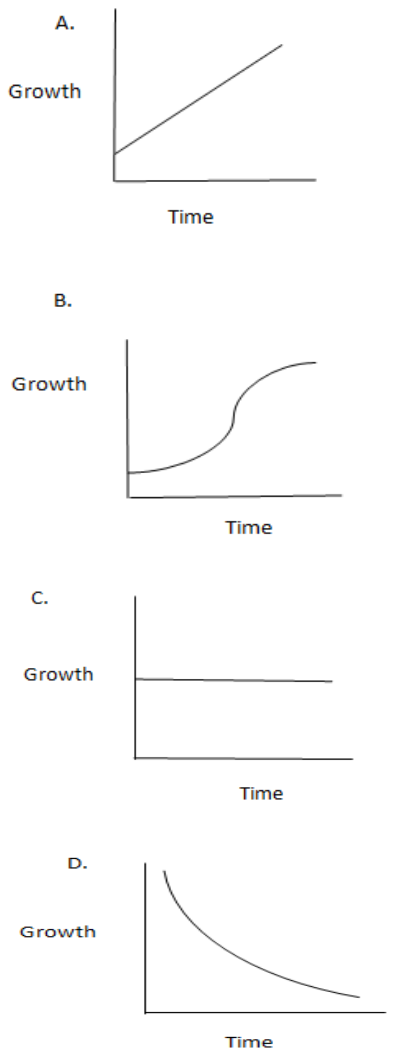
Which one is the correct graph for arithmetic growth?


Answer
565.5k+ views
Hint: Growth is defined as the steps involved in the development of an organism. It is the time from birth to the time of maturity or for some organisms to the time of death. It results from cellular multiplication, cell growth, cell expansion and also maturation.
Complete answer:
- Growth of an organism not only depends on internal signals but also external factors. The most important factor that affects growth is the availability of resources. When the resources are abundant growth occurs at a faster rate but when the resources become limiting the rate of growth also slows down.
- The rate of growth can be calculated by plotting a graph of growth vs time. Different organisms grow at different rates with time which has led to the formulation of four different types of growth- Arithmetic growth, Geometric growth, Sigmoid growth and Absolute growth. In Arithmetic growth the rate of growth is constant and growth occurs in an arithmetic progression.
- In Geometric growth the initial rate of growth is slow but it is followed by a rapid exponential rate. In Sigmoid growth the initial growth is slow, it is then followed by exponential growth, followed by stationary stage and finally a decline in growth. Absolute growth is the measurement of total growth per unit time.
Hence the correct answer is option A) which shows the graph for arithmetic growth.
Note: Growth is a very important step of development for all organisms without which they cannot survive. A knowledge about the different growth curves gives us an idea about the different forms of growth that different organisms undergo to survive and attain maturity.
Complete answer:
- Growth of an organism not only depends on internal signals but also external factors. The most important factor that affects growth is the availability of resources. When the resources are abundant growth occurs at a faster rate but when the resources become limiting the rate of growth also slows down.
- The rate of growth can be calculated by plotting a graph of growth vs time. Different organisms grow at different rates with time which has led to the formulation of four different types of growth- Arithmetic growth, Geometric growth, Sigmoid growth and Absolute growth. In Arithmetic growth the rate of growth is constant and growth occurs in an arithmetic progression.
- In Geometric growth the initial rate of growth is slow but it is followed by a rapid exponential rate. In Sigmoid growth the initial growth is slow, it is then followed by exponential growth, followed by stationary stage and finally a decline in growth. Absolute growth is the measurement of total growth per unit time.
Hence the correct answer is option A) which shows the graph for arithmetic growth.
Note: Growth is a very important step of development for all organisms without which they cannot survive. A knowledge about the different growth curves gives us an idea about the different forms of growth that different organisms undergo to survive and attain maturity.
Recently Updated Pages
Master Class 10 English: Engaging Questions & Answers for Success

Master Class 10 Social Science: Engaging Questions & Answers for Success

Master Class 10 Computer Science: Engaging Questions & Answers for Success

Class 10 Question and Answer - Your Ultimate Solutions Guide

Master Class 10 General Knowledge: Engaging Questions & Answers for Success

Master Class 10 Maths: Engaging Questions & Answers for Success

Trending doubts
A boat goes 24 km upstream and 28 km downstream in class 10 maths CBSE

State and explain Ohms law class 10 physics CBSE

Write a letter to the editor of a newspaper explaining class 10 english CBSE

Distinguish between soap and detergent class 10 chemistry CBSE

a Why did Mendel choose pea plants for his experiments class 10 biology CBSE

What is a "free hit" awarded for in limited-overs cricket?




